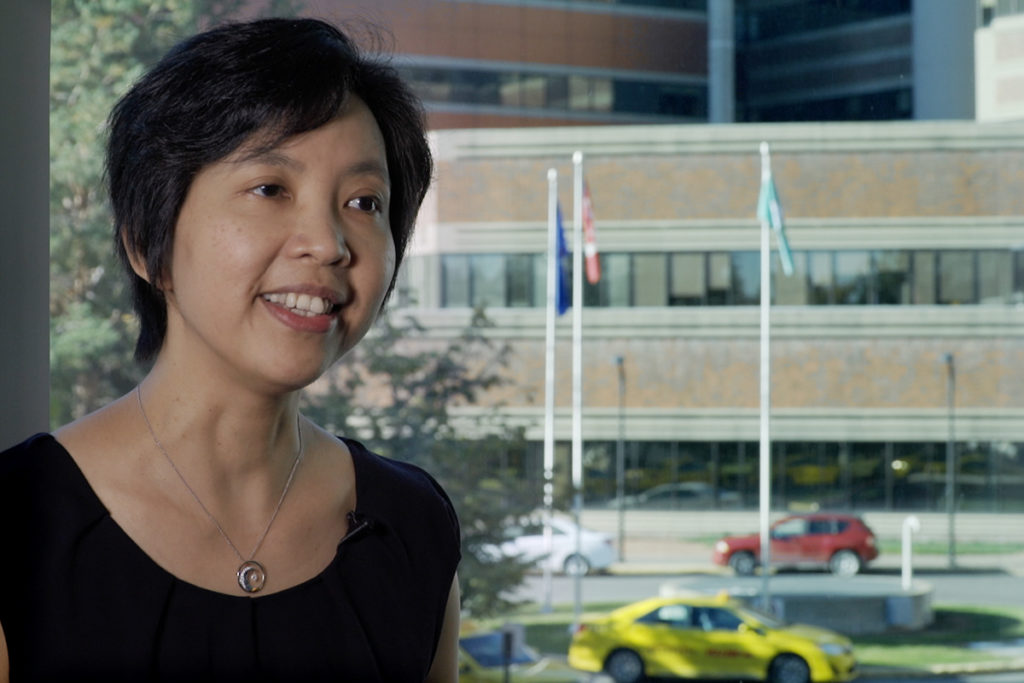Alberta is home to thousands of studies in medical areas like child health, cardiology, and gastroenterology. The Northern Alberta Clinical Trials and Research Centre, a joint venture between the University of Alberta and Alberta Health Services, is proud to help facilitate some of that research.
Dr. Dina Kao, an Associate Professor of Gastroenterology at the University of Alberta, never expected to go into research. When she entered the field of medicine, she always imagined herself being a clinician.
In 2012, however, she was involved in a pharmaceutical trial that was investigating the efficacy of a new product intended to treat Clostridium difficile infection. C. diff most commonly affects people who have taken antibiotics, which kill good bacteria in the large intestine. Without these good bacteria, an individual becomes susceptible to C. diff infection and experiences abdominal pain, diarrhea, and weight loss. In some cases, this infection may keep coming back. There is no medication to prevent this vicious cycle.
Dr. Kao realized that the product might not work in some patients with severe infections and that the C. diff might return. She began looking into other options that she could offer her patients. “I feel very privileged to be in Alberta because we have such phenomenal funding [and] resources available to us,” says Dr. Kao. “I have met with other individuals in a similar field, and even other provinces or in other countries… They just don’t have the same kinds of resources.” These resources made it possible for her to look into new treatments, which led her to the idea of fecal transplantation.

At the time, the procedure wasn’t at the forefront of medicine; the word “fecal” kept the idea under the table. But Dr. Kao thought the idea made sense: instead of trying to kill the C. diff bacteria, fecal transplantation replaced the missing good bacteria in the large intestine with healthy bacteria from a donor’s fecal matter. This treatment option is highly successful and significantly improves quality of life for patients who can’t be cured with antibiotics.
Arie Vandermeer, one of Dr. Kao’s patients, contracted C. diff following antibiotic treatment for an ongoing knee infection, despite having several surgeries. Worse still, the antibiotic therapy for the C. diff infection wasn’t working. As a result, he continued to have diarrhea, couldn’t eat, lost thirty pounds, and was weighing his remaining options. He was referred to Dr. Kao, who explained fecal transplant in the context of a clinical trial and discussed the potential long-term implications. Arie was interested in participating in her study.
The first fecal transplant was unsuccessful. This didn’t surprise Dr. Kao, who knew there was a very good chance that Arie would need more than one transplant due to his severe infection. After further treatment with antibiotics for C. diff, Dr. Kao tried another fecal transplant. The second procedure caused an immediate difference. As a result of this experimental procedure, Arie is no longer having diarrhea, is able to eat again, and can focus on getting better. The difference it made, not only in his own life but also in his family’s lives, was immeasurable.
“We have treatments for all sorts of conditions, but many of the treatments are not perfect. The only way to improve patient care is through research,” says Dr. Kao. “We need researchers. We need good ideas… But ultimately we need patient involvement. If you want to go fast, go alone. If you want to go far, go together.”
At NACTRC, we’re building a network of researchers, sponsors, and members of the public who want to participate in research. By connecting these people, we can pave the way for even more research in our province. Learn more about joining our network and help us improve Alberta’s research environment at nactrc.ca.



